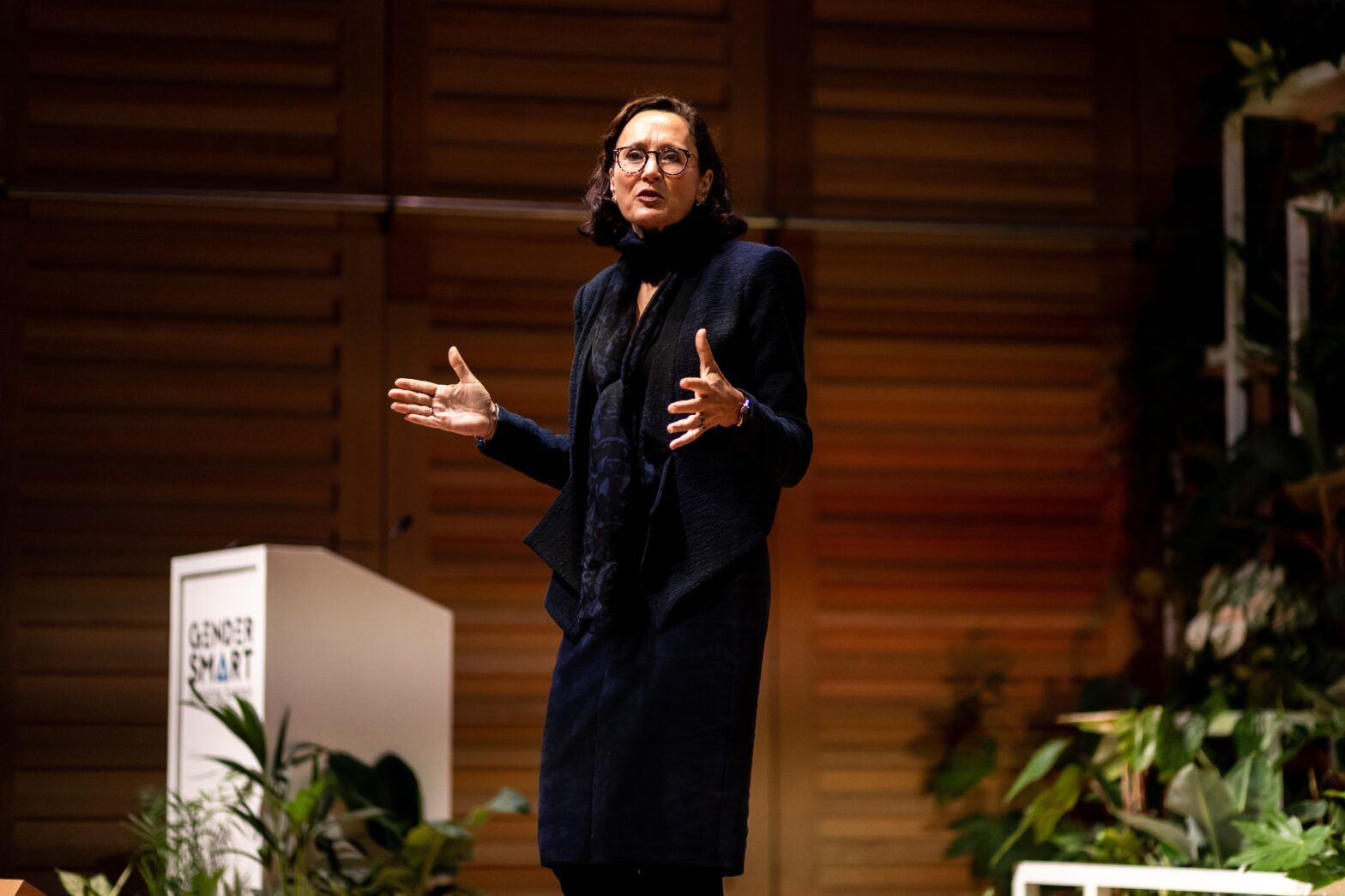Short-termism and focus on power and profit in asset management is scuppering attempts to promote long-term environmental and social goals, according to climate, energy, sustainable development and sustainable finance thought leader, Sandrine Dixson-Declève.
Speaking to ESG Clarity at the recent GenderSmart 2022 Global Summit, Dixson-Declève (pictured) called this centrality of power and profit the “testosterone effect”.
Despite a series of crises around war, energy, climate, inflation, poverty and food there is what she called a “free for all in terms of investing in stranded assets”.
She continued: “The signals are totally broken because of what I call the testosterone effect, [when] all you care about is power and profit.”
Dixson-Declève described issues with financial systems more broadly: “The financial systems no longer reflect people’s needs. Full stop. Nor do they reflect all the planetary needs. And that’s why we need to get back to values-based financial systems.
“It’s all around how much money can you make and how much capital can you make and less about how many people can you bring out of poverty or inequality.”
Dixson-Declève is president of the Club of Rome, a platform of business leaders and intellectuals, which 50 years ago stirred debate by publishing its first report, The Limits to Growth. The paper argued we would overshoot Earth’s carrying capacity within 100 years if we continued with the growth trends in population, industrialisation and resource use that could be seen then.
Reflecting on The Limits to Growth now, Dixson-Declève said there would be no easy way for the asset management industry to account for these limitations because it is part of a financial system driven by short-term profits.
“It’s still very much how much risk can we take and how much profit can we make off of our investments, rather than the long-term resilience building of the economic system,” she explained.
Testing the limits
The financial system could have begun to prepare for where we are now, said Dixson-Declève – in effect, witnessing some degree of collapse from exceeding limits to growth, which the club’s report predicted would happen in the 2020s, as well as reaching social and environmental tipping points.
“Now we have obviously compound effects of crises that are having an impact on the financial system at the same time that we have to totally transform the financial system. And that’s that is the difficulty.
“How do we actually transform the financial system? The short-term lever would have been a robust taxonomy,” said Dixson-Declève referring to European Union’s sustainable finance taxonomy.
Taxonomy vs science
The Club of Rome president was, until recently, a member of the sustainable finance platform – an expert group that worked with the European Commission to develop the taxonomy. She stepped down in protest at fossil gas and nuclear energy being included as sustainable investment activities.
Dixson-Declève said she did not believe the taxonomy as it stands now is in line with environmental science and the project had lost its way when politics got in the way.
“The commission was putting together a proposal that was based on science. They would have… taken the perspective of the independent expert group.
“The member states got more involved at the end of that process to push – and certain member states in particular, Germany and France, to be quite blunt – for gas and for nuclear to be included as [transitional investment activities].
“Even while the sustainable finance platform was finishing off a proposal of what could be transitionary.
“That is the problem – the original idea was great, then the politics kicked in.”
Dixson-Declève encouraged those looking at the governance for the next stage of the taxonomy’s development to take it back to something more expert- and stakeholder-driven and less open to pushbacks.
Restoring ambition
Originally, the taxonomy started with high ambition and, she said, she hoped there would be the same level of ambition in the next iteration which will include criteria around forestry and agriculture. However, she expressed concerns “they will not be as ambitious as they should have been”.
Despite the ways it has tripped up, for Dixson-Declève the taxonomy was the first big step in trying to defuse all of the criticism targeted at ESG.
“It was trying to bring in a much more ambitious set of criteria for climate, environment and social. It would have then been able to be fed much more into the ESG in terms of… the foundation of deep criteria that had been really investigated from the science perspective,” she said.
But there are lessons to be taken from the project, according to Dixson-Declève. “For those of us working in sustainable finance, it’s a real lesson in how you simplify criteria so that they can be usable by different asset classes, and by different investors, and yet still be robust in terms of what we’re trying to achieve in the area of climate, environment, and really reflect our climate and environmental laws, as well as reflect our social laws as well.”
Social taxonomy
There is hope, however, the EU’s social taxonomy – which was recently effectively shelved – can be “regenerated”, Dixson-Declève said.
“I think the European Commission and others are very much committed to continuing.
“Post-Covid-19, in particular, there is a real understanding that we need to better foster in our financial system the shift of capital into the parts of our economy that have really been left to the side like… the care economy, the health economy, the education economy.
“All of which need to have much more capital as we build resilience through our systems to future shocks and stresses.”








